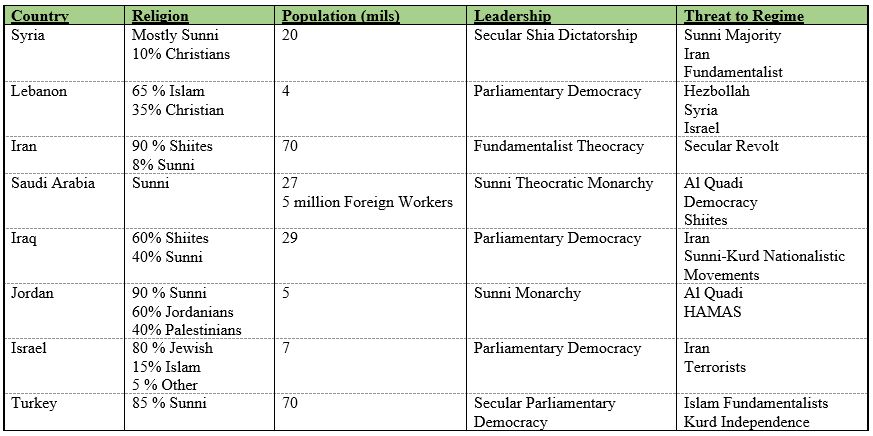Introduction:
Several major developments have coalesced to induce long-standing enemies Israel led by Prime Minister Ehud Olmert and Syria under “President” Basshar Assad to embark on peace talks in Turkey.
First of all, the exorbitant run up in oil prices has provided tremendous leverage to Saudi Arabia over its longtime rival Iran. Saudi Arabia which has financially benefited far more than Iran from the oil spike seeks to use its financial clout to
Contain its regional arch rival Iran whose Shiite theological leaders wish to expand their political sway over Lebanon and Iraq
Contain radical terrorist groups such as HAMAS and Hezbollah
Secure the political support of its 29 million populace by creating a welfare state
Abandon the Palestinians politically, but provide needed financial assistance to these destitute peoples.
Secondly, Syria wants to regain its hegemony over Lebanon and reoccupy the Golan Heights. The forced withdrawal of Syrian troops from Lebanon in 2005 left a void, filled by Hezbollah. The later, a terrorist group with strong ties to Iran poses an immanent threat to the current Lebanon Government. Syria has historically benefited from its close ties to the Christian Marinates of Lebanon and has had longstanding profitable commercial ties to Lebanon.
Thirdly, Israel wishes to reduce the military threat from a combination of Syria, Lebanon, HAMAS and Iran. A peace treaty with Syria would eliminate two potential enemies-Syria and the Hezbollah forces in Lebanon who obtain most of their military equipment through Syria. Furthermore, a Syrian peace agreement would further undermine the Palestinians who are increasingly abandoned and isolated by their “Arab brothers.” Only Iran seems currently committed to militarily supporting the Palestinians whose economic status in both the West Bank and Gaza remains perilous.
Fourthly, Israel recently wiped out an incipient Syrian nuclear program. Syria’s failure to gain any international support against Israel’s unilateral action highlighted the diplomatic isolation of Assad’s regime.
Understanding the Middle East is Complex
The Demography of the Middle East is complex on many levels—ethnic, religious, tribal, economic and cultural. While most countries have a majority of Arabs, there are salient exceptions. Iran has about 50% Persians, Turkey has about 80% Ethnic Turks, and Israel is about 80 % Jews split among Ashkenazi and Sephardic.
Turkey, Iran and Iraq have sizable restive Kurdish populations who would like to create their own “ethnically” based State.
Although the region is primarily Islam, this religion has historically been split primarily between Shiites and Sunnis.
Some states are secular, others are theocracies. Secular regimes such as Turkey, Egypt, Iraq, and Syria are threatened by Islam fundamentalists.
Some states are autocratic and others are democratic.

Bullet Points: Advantages and Disadvantages to Syrian-Israeli Accord
Advantage to Israel
- Isolate Hezbollah in Lebanon
- Isolate Iran
- Alleviate military dangers from Syria and Hezbollah
- Undermine HAMAS in West Bank and Gaza
Disadvantage to Israel
- Give Up Golan Heights
- Antagonize Bush Administration that opposes Syria
Advantage to Syria
- Regain Golan Heights
- Improve Relationship with Saudi Arabia
- Regain Strategic Control over Lebanon
Disadvantage to Syria
- Antagonize Shiite Hezbollah
- Antagonize Iran
- Antagonize Syria’s majority religious group—Sunnis
- Stir up radical religious elements against Syria’s secular party
Background
Syria’s Role in Lebanon
Syria’s control over Lebanon was reduced several years ago (2005) after Lebanon’s citizens rebelled against Syria dominance of Lebanon political life following the assassination of former Lebanese Prime Minister Rafik Hariri. In fact, Syria has historically ruthlessly treated Lebanese politicians and civilians who opposed their dominance of Lebanon.
Unfortunately, the withdrawal of Syrian troops created a vacuum that has been filled by Hezbollah, a terrorist group which has repeatedly attacked Israel, including using missiles. Thus, while initially world opinion fully supported Syrian military withdrawal, the rise of Hezbollah from the ashes of the Syrian defeat has led to revisionist sentiment regarding the proper role for Syria. Stated differently, the weakness of Lebanon’s central government’s has encouraged the growth of Hezbollah, a fanatical terrorist group within Lebanon. Hezbollah virtually rules much of Lebanon and has veto power over the actions of Lebanon’s central government.
Syria’s Historic Animosity Toward Israel
Interestingly enough, until Iran’s virulent anti-Zionism, Syria might have been Israel’s most implacable enemy. That is, Syria incited three wars against Israel—1948, 1967, and 1973. Syria has historically been a provocateur, even arming terrorist groups who mounted insurgency efforts against Israel. Until 1967 Golan Heights was springboard for attacks against Israel.
An Israel- Syrian agreement would end one of the Middle East’s most bitter conflicts. Syria hosts the headquarters of the radical Palestinian groups HAMAS and Islamic Jihad, and it is the closest ally of Hezbollah, which waged a 34-day war against Israel last summer.
On the other hand, Syria and Israel almost reached peace settlement in the past. While the information is sketchy about the cause of the breakdowns, some informants indicate that the impasse was a “sliver of land” once held by Syria but now part of Lebanon.
Love and War Make Strange Bedfellows: Israel’s Diplomatic Status
Thus, while tensions between Israel and Syria has always been strained, there appears to be legitimate reason to believe that a peace settlement can be secured; thereby, giving Israel diplomatic relations with three of its neighbors—Egypt, Jordan, and Syria.
Since 1967 Israel’s major ally has been the United States. In fact, most of the world’s nations have condemned Israel, particularly in resolutions in the United Nations.
While Israel has survived 60 years surrounded by implacable enemies and suffering at times diplomatic isolation from other nations such as the Soviet Union and its Iron Curtain Satellites, Pakistan, Malaysia, and many African nations, Israelis on balance feel that their long term national survival chances improve with worldwide recognition. Ironically, despite Israel’s remarkable economic and military success, the growing anti-Semitism in Western Europe casts a pall on its status. Stated differently, during Israel’s infancy, Israel was supported from European countries such as France, the Netherlands, and Czechoslovakia. Today, Israel can only count on the United States.
Stumbling Bloc to Israeli- Syrian Settlement
Ironically, the major issue of contention between Israel and Syria involves Lebanon, not the Golan Heights. That is, Syria’s agenda in making peace with Israel is receiving tacit American approval for a renewal of Syria’s historic hegemony over Lebanon. For completely different reasons, Iran and the United States oppose Syria’s ambitions.
That is, Syria feels that its historic commercial and security interests in Lebanon have been jeopardized by 1) the withdrawal of Syrian troops and 2) the military presence of Hezbollah. Syria has historically worked well with the Maronite Christians (30% of the population) of Lebanon.
The Bush administration is leery of “rewarding Syria.” That is, Syria’s historic support for radical terrorists such as HAMAS, Hezbollah and Islamic Jihad directly challenges the Bush doctrine of supporting democracy, secularism, and non-violence.
Iran feels that a renewed Syrian presence in Lebanon will emasculate their military ally—Hezbollah.
Conclusion: A Long-Standing Israel-Syrian Peace Agreement Requires the Dexterity of Keeping a 3 Legged Table from Toppling
Syria which has primarily an Arab population has a complex religious and political situation. That is, a majority of Syrians are Sunnis. However, Syria since 1963 has been ruled by the Baath Party, a secular party who are Alawites, a branch of Shia. The head of state since 1970 has been a member of the Assad family. Understandably, Syrian leadership worries that a theocratic Sunni faction could mount a successful coup.
Syria has a contentious relationship with its more populous oil rich Shiite neighbor Iran. That is, Iran whose population numbers about 72 million people—3.5 times that of Syria—is a fundamentalist theological regime that opposes the secular Syrian state.
The rise of Hezbollah in Lebanon, a radical Shiite entity, has seriously complicated the matter further. That is, the Syrian leadership must suppress both radical Sunnis and the Shiite Hezbollah. Hezbollah in particular would be major loser in a Syrian-Israel peace settlement because Syria would reassert its traditional hegemony over Lebanon.
Saudi Arabia sympathizes with its Sunni co-religionists and therefore actively opposes any increase in Iranian power. However, Saudi Arabian Monarch cannot openly support any country’s rapprochement with a Jewish state given the monarchy’s longstanding alliance with the Wahhabist Clerics—a very radical, theologically intolerant Muslim sect.
The dramatic increase in oil prices has made Saudi Arabia relatively more powerful than Iran. That is, the oil largesse in Saudi Arabia is significantly greater than Iran and thus the Saudi’s power and prestige has risen contemporaneously with the increase in the price of oil. Thus, Saudi influence requires an ability to maintain a lavish welfare program for its 29 million citizens, including some 5 million foreign workers.



